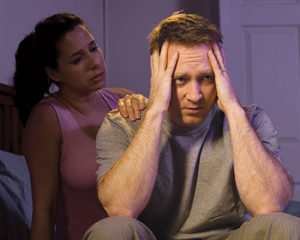Life After Combat: Coping With Adjustment Disorder
You recently returned from a combat tour. Now that you’re home, you’re having a hard time adjusting to a life that’s not the same as it was when you left. This is making your homecoming stressful and unpleasant. Maybe you feel like you don’t fit in at home. Or maybe you don’t seem to have control over your life. You or your family members may have noticed that you’re acting in ways you didn’t before. You could be staying home more, cutting yourself off from others. Or maybe you get angry more easily than before. Emotions and behaviors like these that last more than a month after you return home are signs of adjustment disorder. Help is available to get you feeling better.
What is adjustment disorder?
Adjustment disorder is a problem that can happen as you cope with the stress caused by a major life change. Coming home after serving in a war is one such change. Change is often frightening and can be hard to get used to. It’s normal to feel uncertain, angry, frustrated, or anxious. At first you might think you have no control over the situation. But as you accept and adjust to the change, these feelings typically fade. When the feelings don’t go away over time, it’s a sign of adjustment disorder.
What causes adjustment disorder?
Adjustment disorder can happen to anyone who’s coping with a major source of stress. Even if you’re glad to be home, returning from a deployment is stressful. You may have returned to big family changes, like the birth of a child or the death of a parent or grandparent. You may no longer have the job you had when you left. Your family may have moved into a new house. Your role in the household may also have changed, with your spouse taking on tasks that you used to handle. You also have to get back into a daily routine that’s very different than your lifestyle in the combat zone. The stress caused by these sorts of changes may be adding to your adjustment disorder.
What does adjustment disorder feel like?
 |
| Adjusting to being home and coping with changes that happened while you were away can be stressful. |
Adjustment disorder makes it hard to deal with daily life. It can also create tension between you and your family. Since returning from combat, you may have had emotions and behaviors such as:
-
Anxiety, worry, or fear about being left behind by your family, friends, or the world in general.
-
Being unable to concentrate and having trouble solving problems.
-
A hard time focusing at work or school, and feeling “out of it” most of the time.
-
Sadness, anger, or resentfulness over what changed while you were deployed.
-
A short temper and getting into frequent arguments or lashing out at others.
-
Trouble talking to or getting along with your family and friends.
-
A sense that you don’t fit in at home.
-
Feeling like you no longer have a place in your children's lives.
-
Isolating yourself from others, and staying home alone instead of being social.
-
Problems falling or staying asleep, or sleeping much more than normal.
-
Having loved ones tell you that you’re acting distant or that you’re different than when you left.
-
Using alcohol and drugs to feel better.
-
Having thoughts of suicide.
Treatment for adjustment disorder
Adjustment disorder is often treated with counseling. This involves talking to a trained professional about your problems adjusting to life at home. Together, you’ll come up with new ways to cope with the changes that make you feel more in control. Therapy may be done one-on-one. Or it could be done with a group of other veterans who are facing the same types of challenges. Family or couples counseling may be suggested. Depending on your situation, medicine may also be prescribed to help with depression, anxiety, or sleep.
Getting your life back
Your deployment was a life-changing experience. But there is a place for you here at home. Be patient with yourself. Getting used to major changes can take time. Find time to rest and relax. This can help manage your stress. Gentle forms of exercise, like walking, can also help your mood. Don’t isolate yourself from the people who care about you. Doing so will only make the problem worse. Talk about what’s on your mind with people you can trust. And remember—it’s going to get better. Visit the Department of Veterans Affairs website for returning service members at www.oefoif.va.gov for more information and support.
If you’re not feeling better
The feelings caused by adjustment disorder should go away within 6 months. With treatment, you’ll likely feel better even sooner. But in some cases, you may not feel better, even after treatment. Then there may be something else going on. Adjustment disorder has many symptoms in common with other conditions. These include post-traumatic stress disorder (PTSD), depression, and anxiety disorder. You don’t have to live with these feelings. Talk with your doctor so you can get the help and treatment you need.
If you have thoughts of harming yourself, get help right away. Remove, or ask a trusted family member or friend to remove, anything that you could use to harm yourself, like guns, other weapons, or medicines. If there is an immediate risk, call or text 988 or go to the nearest hospital emergency room.
If there is no immediate risk, call your doctor, or get help online. In the U.S., the Veterans Crisis Line is available 24 hours a day, 7 days a week at 988 and press 1 or at www.veteranscrisisline.net. Or you can text 838255. The Veterans Crisis Line gives immediate crisis intervention and information about local resources. It's free, and all calls are private .